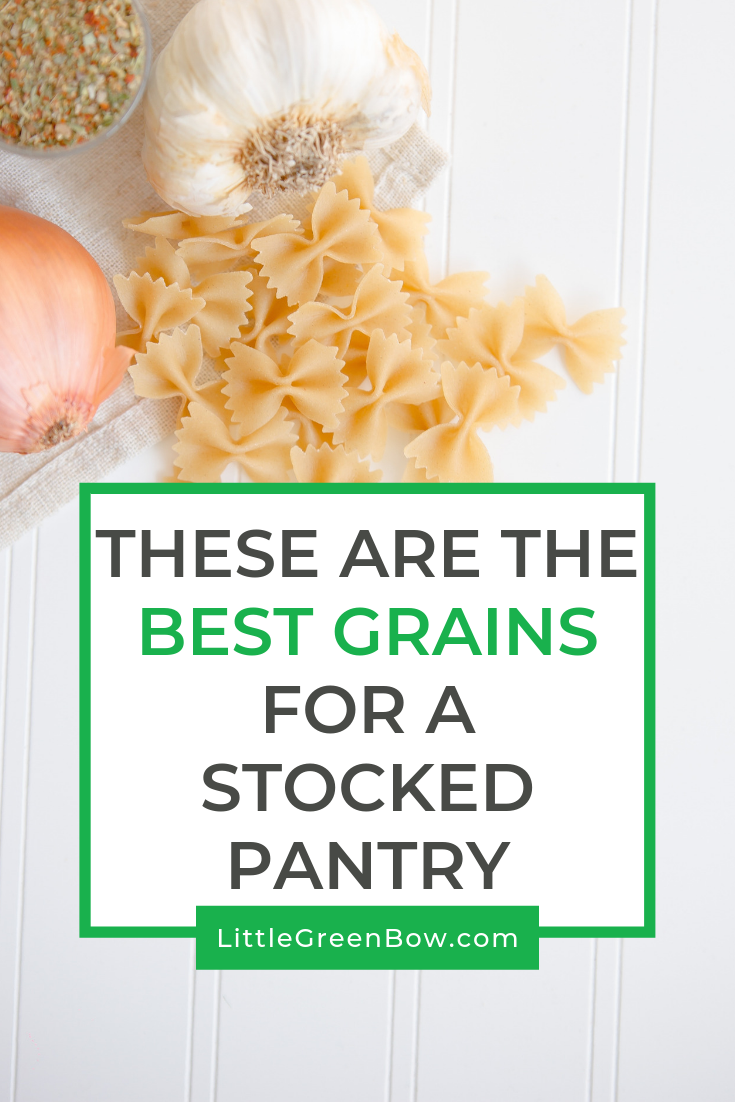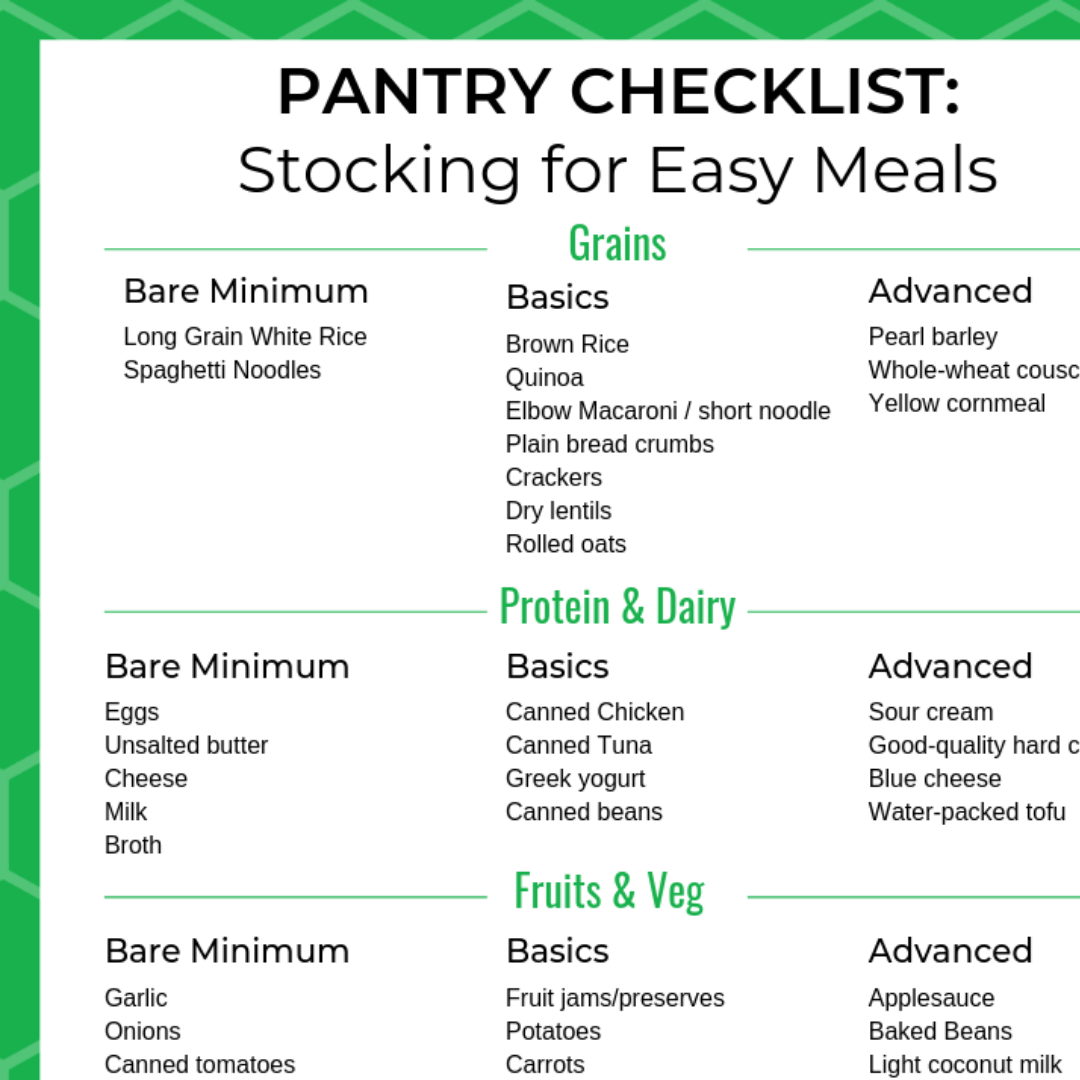How to Stock a Pantry for Easy Meals
Before I knew how to stock a pantry for easy meals I used to go about it totally backwards. I would find a few meals I wanted to make for the week, write out the grocery list (which was usually a mile long) and then go shopping.
It’s the pretty normal way of shopping, right?
So, what was I doing wrong? It’s okay, if you don’t know because you are probably doing it too.
I was not coordinating ingredients or using a well stocked pantry!
That meant I was always buying a bunch of ingredients at the store - which took me a long time and cost me more money - and it took WAY more mental preparation.
Once I discovered Capsule Meal Plans, I learned how to group meals together and keep my ingredient list low. And the beauty of Capsule Meal Plans is that since they only need about 20 different ingredients for a whole week of dinners, they give you time to stock your pantry slowly, which will save you money in the long run.
How to Smartly Stock Your Pantry
Below are the major categories in a pantry and the items you need are separated by bare minimum, basics, and advanced.
The Bare Minimum ingredients are those things you use on a very regular basis and so it’s best to always have them on hand. If you are starting your pantry from scratch, these are the items you want to buy first.
The Basics are the next level for filling your pantry. Perhaps you have been cooking for a while or are getting serious about making dinner for your family every night. These are the ingredients you will use often and it’s best to buy them when a recipe calls for it. Don’e be nervous about buying these and having them go to waste. These ingredients are versatile and so you can make many, many different meals with these.
The Advanced section of this pantry items list is for the more experienced home chefs or those of us who love a certain flavor palette like Indian or Chinese cuisine. If you like cooking with lots of flavors, this section will be useful. However, if you are just starting out, on a tight budget, or prefer simple flavors you can easily skip this section.
Top Grains Needed for a Well-Stocked Pantry:
Bare Minimum Grains:
Long Grain White Rice
Spaghetti Noodles
Basic Grains:
Brown Rice
Quinoa
Elbow Macaroni or other short noodle
Plain bread crumbs
Crackers
Dry lentils
Rolled oats
Advanced Grains:
Pearl barley, quick-cooking barley
Whole-wheat couscous
Yellow cornmeal
Polenta
The Best Protein & Dairy to Keep in a Well-Stocked Pantry
Bare Minimum Protein and Dairy:
Eggs
Unsalted butter
Cheese (Cheddar or a Colby Jack)
Milk
Reduced-sodium chicken broth, beef broth and/or vegetable broth (box-packed tastes better than canned)
Basic Protein and Dairy:
Canned Chicken
Canned Tuna
Low-fat or nonfat plain or Greek yogurt
Canned beans: white beans, chickpeas, black beans, red kidney beans
Advanced Protein and Dairy:
Reduced-fat sour cream
Good-quality Parmesan cheese and/or Romano cheese
Sharp Cheddar cheese
Blue cheese
Water-packed tofu
The Best Fruits and Vegetables You Need for a Stocked Pantry
Bare Minimum Fruits and Veggies:
Garlic
Onions
Canned tomatoes
Tomato sauce
Basic Fruits and Veggies:
Fruit jams/preserves
Potatoes (such as Yukon Gold)
Carrots
Canned or Frozen corn
Advanced Fruits and Veggies:
Applesauce
Baked Beans
Light coconut milk
Assorted dried fruits, such as apricots, prunes, cherries, cranberries, dates, figs, raisins
Bare Minimum Oils, Vinegars, and Condiments:
Extra-virgin olive oil
Neutral cooking oil (such as canola or grape seed)
Basic Oils, Vinegars, and Condiments:
Mayonnaise (olive-oil mayo has less saturated fat)
Vinegar: white, red-wine, white-wine or cider
Dijon mustard
Ketchup
Balsamic Vinegar
Cooking Spray
Hot sauce
Salsa
Dark soy sauce
Advanced Oils, Vinegars, and Condiments:
Sriracha
White Cooking Wine
Red Cooking Wine
Flavorful nut and seed oils, such as toasted sesame oil and walnut oil
Rice wine vinegar
Fish sauce
Curry paste
Barbecue sauce
Worcestershire sauce
What Spices and Seasonings are Best for Well-Stocked Pantry?
Bare Minimum Seasonings and Spices:
Kosher salt
Red-pepper flakes
Bay leaves
Black peppercorns
Ground cumin
Garlic powder
Dried thyme
Dried oregano
Honey
Basic Seasonings and Spices:
Maple syrup
Brown sugar
Dry mustard
Sweet paprika
Ground cinnamon
Basil
Bullion (Beef or Chicken)
Cayenne Pepper
Chili Powder
Fennel
Nutmeg
Onion Powder
Rosemary
Taco Seasoning
Advanced Seasonings and Spices:
Curry powder
Celery Salt
Dill
Tarragon
Allspice
Cinnamon sticks
Freezer Staples for a Well-Stocked Pantry
Bare Minimum Freezer:
Frozen veggies (variety bag)
Berries or other fruit
Basic Freezer:
Fish fillets
Sliced bread
Peas
Advanced Freezer:
Meat (that was a good price)
Nuts:
Bare Minimum Nuts:
Peanut butter
Basic Nuts:
Walnuts
Almonds
Dry-roasted unsalted peanuts
Advanced Nuts:
Pine nuts
Sesame seeds
Tahini
Natural almond butter
Baking:
Bare Minimum Baking:
All-purpose flour
Granulated Sugar
Cornstarch
Baking soda
Baking powder
Pure vanilla extract
Light brown sugar
Powdered sugar
Cocoa powder
Basic Baking:
Cornmeal
Rolled oats
Dark brown sugar
Bittersweet baking chocolate
Semisweet chocolate chips
Advanced Baking:
Almond Extract
Corn Meal
Corn Syrup
Evaporated Milk
Yeast
With these ingredients you are well on your way to knowing how to stock a pantry for easy meals.
Looking for an easy downloadable list to take with you shopping?
I have created a checklist for you and included it in the Freebies Library. Simply sign up for access and I will send you the password right away.
Free Stocked Pantry Checklist and Shopping List. Perfect for beginners, those on a budget, and anyone who wants to make dinner for their families.
Join the Little Green Bow Community and get access to the Freebie Library including this Pantry Checklist. I'll send you my weekly newsletter filled with tips on how to live your best life too.
Remember, start with the Bare Minimum ingredients - these are the ones you will use all the time and can’t go wrong having them on hand. Next, add in the Basic ingredients as recipes you make call for them. This will help you build up your pantry at a good pace without having to spend a lot of money up front. Once you have mastered cooking on a regular basis, then add in the Advanced ingredients as you need them.
This list is to be used as a reference so there may be items here you never find yourself needing. That’s okay and why I recommend you only buy what you need when you need it.



















